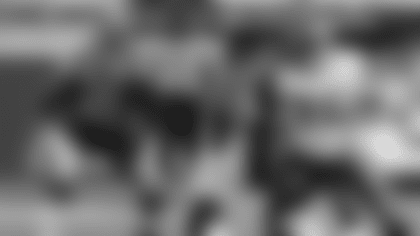When the Seahawks play the Rams on Sunday, it will be Pete Carroll's first game at the Los Angeles Memorial Coliseum since he left USC for Seattle in 2010. For Richard Sherman, it will be his first game there since he was at Stanford, and it will be the first ever game there for Bobby Wagner, who grew up in nearby Ontario, California, but was not recruited by Carroll's Trojans or any other Pac-12 school.
But while Sunday's game, which is the Rams' home opener, will have some extra meaning for Carroll, Sherman, Wagner, and other L.A. natives on Seattle's roster like Cassius Marsh and Paul Richardson, to really understand what the Rams' move back to L.A. can mean, it doesn't take a highly-anticipated NFL game. Instead, a trip to Inglewood High School on a sunny July afternoon does a pretty good job illustrating the significance of the Rams' return to L.A.
When James Sims heard the Los Angeles Rams were returning to Los Angeles, one of the first things Inglewood's athletic director and football coach did was start working the phones.
Less than six months after NFL owners voted to allow the relocation of the Rams from St. Louis, Rams and Seahawks assistant coaches, Raiders defensive coordinator Ken Norton Jr. and Wagner were on a stage in Inglewood's auditorium leading a free tackling clinic for local youth, high school and junior college coaches, as well as players from Inglewood and elsewhere.
"Once we found out the Rams were coming to L.A., we started pursuing avenues to get help through the NFL," Sims said at that clinic in July. "I got on the phone and started making calls."
The Rams departure from St. Louis is obviously unfortunate news for that city, but as that Saturday afternoon in Inglewood showed, their return to L.A. can mean big things for another city, and not just because it gives football fans a hometown team to cheer for on Sundays.
Few people know that better than Carroll. While leading the Trojans for nine years, Carroll was closely connected with the community through his work with A Better L.A., the nonprofit he founded in 2003 that worked both with gang leaders and law enforcement to "support community-based solutions to restore peace, save lives and link individuals in the inner city to resources they need in order to thrive."
Carroll is still involved with A Better L.A., as well as A Better Seattle, which he started after moving here, but he also admits it's harder to be as involved in Los Angeles now as he was in the past, which is why the Rams can be so important to that community.
"They're in a position to do a tremendous amount of goodwill work in an area that needs it desperately, that needs the boost," Carroll said. "We were down there trying to do stuff and it was hard because there's just so many people. It was so big, it was hard to make an impact. They'll have the best chance and I'm sure they'll do a great job."
While Carroll was at USC, and for much of the decade prior to that, America's second-largest city was without NFL football, which means Seattle's players from that area didn't grow up knowing what it was to have NFL players in their community. Sherman, who is from Compton, has mentioned that in the past as one of his motivations for the work his Blanket Coverage Foundation does both in the Puget Sound region and in Los Angeles.
"It can mean a great deal," Sherman said. "When you have role models like that, when you have people giving back, whether it's their time or financially, it makes a huge difference. You give kids something else to aspire to. You give kids more goals to aspire to attain. Anytime you give them more that's tangible, they can see it, they can feel it, they can see how it's represented—and I'm sure (the Rams) will be getting involved in the community and going to speak to the kids and delivering a positive message—I think all those things culminating will be pretty outstanding."
Sherman was recruited by Carroll and USC, but ultimately chose to play at Stanford. But even as a teenager at Dominguez High School, he understood that Carroll and USC football meant a lot to the city, not just to football fans.
"He's a big deal," Sherman said. "Not just because of what USC was doing—obviously they were winning a lot while he was there—but he did a lot of work in the community. He did a lot of work in areas that most coaches wouldn't even go into. There were a lot of housing projects that he would go into that I wouldn't even go into, realistically. People respected all of the work he did in the community, so they allowed him pretty much a free pass to go wherever he wanted, because he really put his money where his mouth was and helped the community a great deal, and did what he could to make it a better place."
When he visited Inglewood last summer, Wagner said, "I would have loved to have a team here growing up. Bringing a team here is going to excite the city. It's more people with the power to help influence kids."
Said Inglewood tackle Calvin Mosley, "It's great they're reaching out to the community… It's means a lot, especially for athletes."
Inglewood defensive back Teshawn White didn't grow up having a team to watch, but is excited to have the Rams in his hometown now: "It's something special. I missed the chance to have the Rams here before. My dad was always telling me about them. I like seeing them contribute to the community, and someday I'd like to be able to the same."
As for the game itself, Carroll said he's looking forward to a return to the Coliseum, which he called, "a great place to play whenever you get to play there. Whether it's the Olympics, football, baseball or whatever. It's a great place and it always has been. It's just fun to go there.
"Nothing but fond memories and fun. We had a great time down there, we were so lucky to be there. SC was such a blast and we had so many good times and were able to connect with so many people and all that. It was just a treasure. It's the fondest (of memories). We've been gone quite a while now, but feel so connected to all the sports that are down there and what's going on and the community, that kind of stuff. It's been a lot harder for me to carry on the work that I was talking about, it's gotten really difficult as the years added up. I always feel a responsibility and whenever I can do something to return the help, I do. There's still a connection. It was that deep of an experience there with the fans, the school, the community."
Sherman also has fond memories of playing in the Coliseum, in particular Stanford's stunning upset over second-ranked USC early in the 2007 season, as well as the Cardinal's 2009 win at USC.
"Pete still holds it against me," Sherman said, "So don't bring it up, he gets an attitude… It's going to be fun, I have a lot of great memories—fond, very fond."






